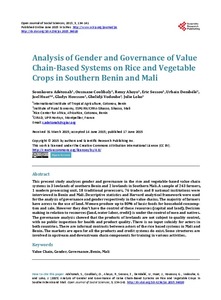Analysis of Gender and Governance of Value Chain-Based Systems on Rice and Vegetable Crops in Southern Benin and Mali
Abstract
This present study analyses gender and governance in the rice and vegetable-based value chain
systems in 3 lowlands of southern Benin and 2 lowlands in Southern Mali. A sample of 243 farmers,
1 modern processing unit, 18 traditional processors, 76 traders and 8 national institutions were
interviewed in Benin and Mali. Descriptive statistics and Harvard analytical framework were used
for the analysis of governance and gender respectively in the value chains. The majority of farmers
have access to the use of land. Women produce up to 80% of basic foods for household consumption
and sale. However they don�??t have the control of these resources (capital and land). Decision
making in relation to resources (land, water labor, credit) is under the control of men and natives.
The governance analysis showed that the products of lowlands are not subject to quality control,
with no public inspection for health and product quality. There is no input subsidy for actors in
both countries. There are informal contracts between actors of the rice based systems in Mali and
Benin. The markets are open for all the products and credit systems do exist. Some structures are
involved in upstream and downstream chain components for training in various activitiesThis present study analyses gender and governance in the rice and vegetable-based value chain
systems in 3 lowlands of southern Benin and 2 lowlands in Southern Mali. A sample of 243 farmers,
1 modern processing unit, 18 traditional processors, 76 traders and 8 national institutions were
interviewed in Benin and Mali. Descriptive statistics and Harvard analytical framework were used
for the analysis of governance and gender respectively in the value chains. The majority of farmers
have access to the use of land. Women produce up to 80% of basic foods for household consumption
and sale. However they don�??t have the control of these resources (capital and land). Decision
making in relation to resources (land, water labor, credit) is under the control of men and natives.
The governance analysis showed that the products of lowlands are not subject to quality control,
with no public inspection for health and product quality. There is no input subsidy for actors in
both countries. There are informal contracts between actors of the rice based systems in Mali and
Benin. The markets are open for all the products and credit systems do exist. Some structures are
involved in upstream and downstream chain components for training in various activities

